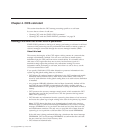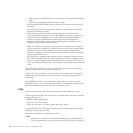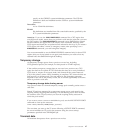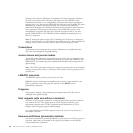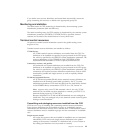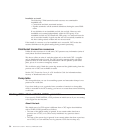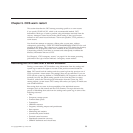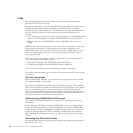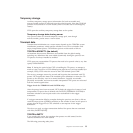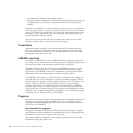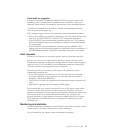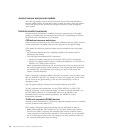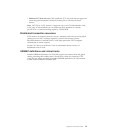
Chapter 5. CICS warm restart
This section describes the CICS startup processing specific to a warm restart.
If you specify START=AUTO, which is the recommended method, CICS
determines which type of start to perform using information retrieved from the
recovery manager's control record in the global catalog. If the type-of-restart
indicator in the control record indicates “warm start possible”, CICS performs a
warm restart.
You should not attempt to compress a library after a warm start, without
subsequently performing a CEMT SET PROGRAM(PRGMID) NEWCOPY for each
program in the library. This is because on a warm start, CICS obtains the directory
information for all programs which were installed on the previous execution.
Compressing a library could alter its contents and subsequently invalidate the
directory information known to CICS.
See Chapter 6, “CICS emergency restart,” on page 61 for the restart processing
performed if the type-of-restart indicates “emergency restart needed”.
Rebuilding the CICS state after a normal shutdown
During a warm restart, CICS initializes using information from the catalogs and
system log to restore the region to its state at the previous normal shutdown.
Note: CICS needs both the catalogs and the system log from the previous run of
CICS to perform a warm restart—the catalogs alone are not sufficient. If you run
CICS with the system log defined as TYPE(DUMMY), CICS appears to shut down
normally, but only the global catalog portion of the warm keypoint is written.
Therefore, without the warm keypoint information from the system log, CICS
cannot perform a warm restart. CICS startup fails unless you specify an initial start
with START=INITIAL.
Recovering their own state is the responsibility of the individual resource
managers (such as file control) and the CICS domains. This topic discusses the
process of rebuilding their state from the catalogs and system log, in terms of the
following resources:
v Files
v Temporary storage queues
v Transient data queues
v Transactions
v LIBRARY resources
v Programs, including mapsets and partitionsets
v Start requests
v Monitoring and statistics
v Journals and journal models
v Terminal control resources
v Distributed transaction resources
v URIMAP definitions and virtual hosts
© Copyright IBM Corp. 1982, 2010 53



